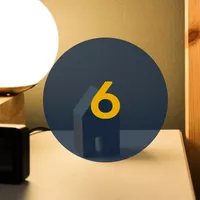Jāna et Frederīcus nocte fessī sunt.
Jana und Frederick sind nachts müde.
Jana and Frederick are tired at night.
Septimā hōrā cēnam ūnā edunt.
Zur siebten Stunde essen sie zu Abend.
At the seventh hour they eat dinner.
Fīlius eōrum cum iīs cēnam ēst.
Ihr Sohn wird mit ihnen zu Abend essen.
their son will eat dinner with them.
ōtiō fruuntur et tēlevīsiōnem ūnā spectant.
Sie genießen ihre Freizeit und schauen fern.
They enjoy leisure time and watch television.
Fīlius eōrum quoque tēlevīsiōnem spectat.
their son also watches television.
Octāvā hōrā fīlium suum cubitum īre jubent.
Um acht Uhr forderten sie ihren Sohn auf, ins Bett zu gehen.
At eight o'clock they bid their son go to bed.
Jāna in balneō sē aquā calidā lavat.
Jana wäscht sich in der Badewanne mit warmem Wasser.
Jana washes herself in the bath with warm water.
Frederīcus in balneō pluviō sē lavat, et dentēs purgat.
Frederick wäscht sich unter der Dusche und putzt sich die Zähne.
Frederick washes himself in the shower and brushes his teeth.
Jāna librum legit, sed dormītat.
Jana las ein Buch, schlief aber ein.
Jana was reading a book, but fell asleep.
Frederīcus quoque mox dormītat.
Frederic also soon fell asleep.
Haec est eadem fābula ā Jānā nārrāta.
This is the same fable as told by Jānā.
Ego et Frederīcus nocte fessī sumus.
Frederick and I are tired at night.
Septimā hōrā cēnam ūnā edimus.
At seven o'clock we ate dinner.
Fīlius noster nōbīscum cēnam ēst.
let our son eat dinner with us.
ōtiō fruimur et tēlevīsiōnem ūnā spectāmus.
We enjoy leisure time and watch television.
Fīlius quoque tēlevīsiōnem spectat.
the son also watches television.
Octāvā hōrā fīlium cubitum īre jubēmus.
At eight o'clock we ordered the children to go to bed.
In balneō mē aquā calidā lavō.
in the bathroom I wash with warm water.
Frederīcus in balneō pluviō sē lavat, et dentēs purgat.
Frederick washes himself in the shower and brushes his teeth.
Librum legō, sed dormītō.
Ich habe ein Buch gelesen, bin aber eingeschlafen.
I read a book, but fell asleep.
Frederīcus quoque mox dormītat.
Frederic also soon fell asleep.
Quaestiōnēs.
Questions.
1) Jāna et Frederīcus fessī sunt.
1) Jana and Frederick are tired.
1) Яна и Фредерик устали.
Suntne Jāna et Frederīcus fessī?
Are Jana and Fredericus tired?
Ita, fessī sunt.
yes, they are tired.
Да, они устали.
2) Septimā hōrā cēnam edunt.
2) At the seventh hour they eat dinner.
Sextāne hōrā cēnam edunt?
Do they eat dinner at six o'clock?
Они ужинают в шесть часов?
Nōn, sextā hōrā cēnam nōn edunt.
no, they do not eat dinner at the sixth hour.
Septimā hōrā edunt.
they eat in the seventh hour.
3) Fīlium habent.
3) they have a son.
Fīliamne habent?
do they have a daughter
Immō, nōn fīliam, sed fīlium habent.
no, not a daughter, but they have a son.
Нет, не дочь, но у них есть сын.
4) Fīlius ūnā cum iīs tēlevīsiōnem spectat.
4) the son watches television with them.
Spectatne fīlius tēlevīsiōnem?
Does your son watch television?
Ita, fīlius ūnā cum iīs tēlevīsiōnem spectat.
so, the son watches television with them.
Да, сын смотрит с ними телевизор.
5) Octāvā hōrā cubitum it.
5) Octāvā hōrā goes to bed.
Nōnāne hōrā fīlius cubitum it?
What time does the son go to bed?
Во сколько сын ложится спать?
Nōn, octāvā hōrā cubitum it.
nōn, octāvā hōrā he went to bed.
6) Jāna in balneō sē aquā calidā lavat.
6) Jāna washes himself in the bath with warm water.
Lavatne sē in balneō pluviō?
Does he wash himself in the rain bath?
Immō, Jāna nōn in balneō pluviō sē lavat.
no, Jāna does not wash himself in the rain bath.
Нет, Джана не моется в дождевой ванне.
In balneō sē aquā calidā lavat.
in the bath he washes himself in warm water.
7) Frederīcus in balneō pluviō sē lavat, et dentēs purgat.
7) Frederick washes himself in the shower and brushes his teeth.
Purgatne Frederīcus dentēs?
Does Frederick brush his teeth?
Ita, Frederīcus in balneō pluviō sē lavat, et dentēs purgat.
Thus, Frederick washes himself in the rain bath and brushes his teeth.
8) Jāna librum legit.
8) Jāna reads a book.
Legitne Jāna librum?
does Jāna read the book?
Ita, librum legit.
yes, he reads a book.

